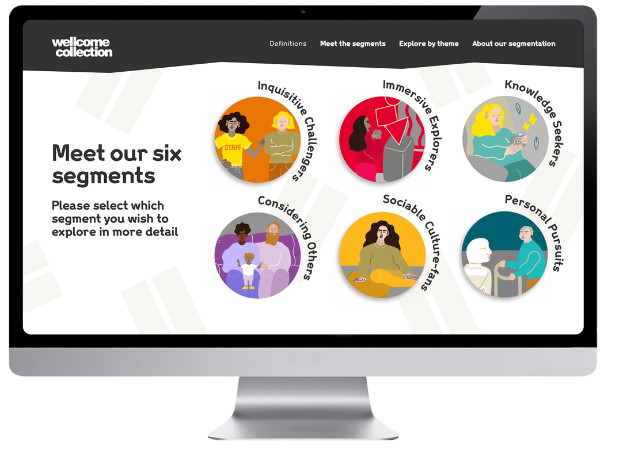Taking a more inclusive approach to audience segmentation
12 September 2023
Research Director, Rebecca Green was invited to speak at the Visitor Studies Group Conference in London earlier this year, alongside Rachel Collins, the marketing lead from Wellcome Collection, on the topic of taking a more inclusive approach to audience segmentation.
The event took place in May 2023 with delegates coming together from across the UK cultural sector (and beyond) to share and reflect on experiences of developing inclusive visitor studies practice.
The conference sought to “explore the role of research and evaluation in championing equity and accessibility, and looked at how evaluation can be used as a tool in efforts to foster a sense of belonging and welcome for visitors of diverse backgrounds.”
DJS Research and Wellcome Collection -- Taking a more inclusive approach to audience segmentation
Rebecca and Rachel presented a case study titled 'Taking a more inclusive approach to audience segmentation' about the development of a new audience segmentation system for Wellcome Collection, that aligns with its intention to “embed AD&I into every aspect of Wellcome Collection” and reduce barriers for d/Deaf, disabled, neurodivergent and racially minoritised people.
During their presentation together they discussed how Wellcome Collection scoped and commissioned its segmentation and how the Wellcome team worked with DJS Research to gather data and develop segments in an inclusive way as well as their experience of embedding inclusive practice when commissioning and delivering visitor research.
What approach did they take?
Segments were not built based on the characteristics of priority audiences, instead, exploratory research was used to understand the specific considerations for these audiences. Priority audiences were oversampled to ensure their representation in the data and inclusive methods were used to ensure priority audiences could participate.
Research perspectives were gathered from a cross section of departments and teams; physical and digital audiences, generalist and specialist users, people from a range of racially marginalised groups, and d/Deaf, disabled and neurodivergent people.
The five key takeaways from the project were to:
- Budget for expert advice
- Build in a plurality of voices
- Design flexibly: allow scope to adapt your research tools as well as your methods
- Allow time for discussion and critique
- Be prepared to confront your own prejudices and pre-conceptions
Speaking about the event, Rebecca said:
“It was fantastic to spend the day with so many talented, enthusiastic audience researchers. Culture is a sector that’s often short-changed on time and resources, so it was inspiring to hear people’s creative approaches to making research more and a timely reminder that we have a responsibility to actively advance equity within our professional practice.”
The event also gave Rebecca many thoughts and ideas about audience engagement and the importance of equity.
“I was reminded about how much can be learned outside of the 'conventional' or 'gold standard' research methods. Proportionality is important (doing evaluation suitable to the scale of the overall project) and meaningful audience engagement is more important than confidence intervals or margins of error,” she said.
“I was challenged to think about the limits of my own practice, what I can’t do as a cis White university-educated woman, and what I shouldn’t attempt to do. For me, the most compelling stories in the conference came from museum and gallery professionals working with members of under-represented and under-served communities as their guides and facilitators. This approach provides re-assurance and understanding for participants and also ensures that the voices of those communities are fully heard and understood without being heavily filtered through the project commissioner’s culture.
“And this in turn brings me back to the importance of equity across society. Museums and galleries are often acutely aware that their workforces lack diversity (one excellent article among many can be viewed here) and market research, particularly outside the capital, faces similar challenges. It would be easy to see these are separate issues, but actually, they’re closely connected. We can’t be inclusive researchers unless and until we’re inclusive employers, managers, leaders and teammates.”
Also speaking at the event were researchers from Imperial War Museum, Wallace Collection; University College London; Science Museum Group and The Social Investment Consultancy; R&A World Golf Museum; Royal Crown Derby Museum; and the V&A Museum.













